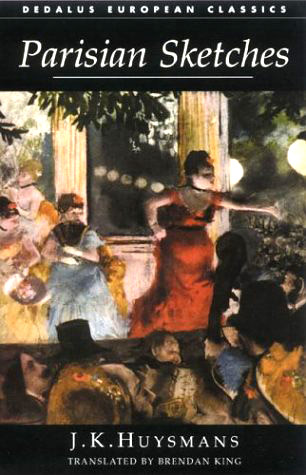Parisian Sketches by J-K Huysmans.
Translated with an introduction and notes by Brendan King.
Published by Dedalus Books, 2004. Price £6.99

| |
Damiens
For Robert CazeThe intensity of these painful pleasures wrenched a cry from my throat; my ears were full of buzzing and my eyes were closed; it seemed to me that my nerves were churning and my head was going to split open; I almost lost consciousness; then, after a while, my senses came back to life – hearing first – and in the distance, the far distance, as if in a dream, I heard a flush of water and the sound of a door.
Eventually, I opened my eyes and looked around me; I was alone, in a bedroom hung with red wallpaper, with muslin curtains veiling the cross of the windows. Above a sofa covered in crocheted lace was a round mirror set at a slight incline against the wall, and at this angle it reflected the part of the room to which my back was turned. I could see a chimney-breast surmounted by a clock with a broken pendulum and candleholders with no candles in them, and on either side of a marble washbasin were two very low, splay-fronted armchairs positioned under two burning gas-lamps that were hissing in the silence of the room.
Like a bed of dazzling tulips arrayed around a clear pool, flames of colour were kindling in a circle around the mirror, in the bevelling that ran inside the gilded wood of the frame. My hypnotised eyes were burning, I wanted to tear them away from this rim of scorching flowers and plunge them, so as to refresh them, in the water of the mirror; but in the midst of the images of furniture that filled it, a fleck of gold leapt out from the chimneybreast and sparkled, stinging my overtired pupils with its harsh fires.
Suddenly, with a supreme effort, I averted my eyes and raised them above my head towards the heavens, beseeching a renewal of energy, a resurgence of strength.
Then I saw a hideous sight.
Motionless on a bed, his legs naked and his feet contorted, his rigid arms stuck to his body, lay a man, his night-shirt gathered up over his knees. His swimming eyes seemed ready to drip, liqueur-like, down the folds of his cheeks; his haggard features, pale and gaunt, and a thin nose joined to the mouth by deep wrinkles, betrayed irreparable anxieties, inconsolable sorrows, laborious tragedies.
And over the skin of this still breathing corpse ran a slow shudder.
It seemed to me that, somewhere or other, I had already beheld this unfortunate, dying on a bed. I was vainly wandering in the mists of my memory when suddenly, as if through a clearing, my thoughts clarified. It was in the Rue Bonaparte, in the window of a print-seller; there, amid a jumble of images, a simple old engraving had taken me by surprise. It depicted a man stretched out on a mattress, bound hand and foot with straps, dead eyes rolling in his ravaged face. Close by, soldiers sporting perukes and tricorn hats, dressed in officers’ jerkins and culottes buckled at the knee, were standing to attention, swords in their fists, while behind them two judges in clerical habits were staring, pens in hand, with a contemplative air at the vault of the prison cell in which the scene was taking place.
And in a flash, I remembered the title written in pencil under the old print: Damiens. And my thoughts went back through the ages to that man who had so childishly attempted to kill a King with a penknife. I attended the solemn interrogation brought to mind by the engraving, then I imagined the guilty man being quartered, as indeed he was, by four horses, on the Place de Grève. And I began to tremble, for the image I had seen above my head was my own reflection in a mirror fixed to the top of the bed on which I was lying: face distorted, eyes sunken, arms rigid, cleaving to the body, night-shirt gathered above the knee.
The sound of a door and the coming-and-going of footsteps broke the spell of the obsession that was haunting me. I sat up in bed, shattering the pitiful portrait mirrored by the ceiling of the bed, re-assuming my own facial expression, and finally re-entering my own skin.
I got up and, going over to the chimney, on the mantelpiece of which shone a golden twenty-franc piece I had put there beforehand, I smiled to myself and thought:
The physical analogy I conjured up between the posture of the clumsy assassin and my own is, from the spiritual point of view, perhaps even more just.
For in effect had I not endured, morally-speaking, a torture identical to that which was inflicted on the body of the regicide?
Had I not myself been pulled and jerked on a spiritual Place de Grève by four differing reflections, quartered as it were: — firstly by thoughts of contemptible lust; — then by an immediate disillusion of desire on entering the room; — next, by penitential regret for the money spent; — and finally, by that expiatory feeling of anguish these fraudulent sensual contracts, once committed, inevitably induce.
